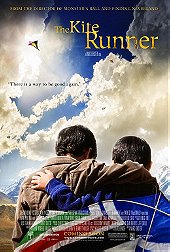''The Mullahs want to rule our souls... and the Communists tell us we don't have any.''
After spending years in California, Amir returns to his homeland in Afghanistan to help his old friend Hassan, whose son is in trouble.
Khalid Abdalla: Amir
The Kite Runner is a very sad movie. This emphasized by the fact the main characters begin and transition as children. There are moving emotional stories and the unsuccessfully delivered ones - I don't believe that just because I'm moved to tears, a movie deserves the highest praise. The Kite Runner glides between the good and bad to deliver heart-wrenching moments and some very transparent messages.
Basically The Kite Runner's story is this, Amir is the son of a wealthy businessman, and Hassan is the Hazara son of one of the servants in Amir's household. Amir and Hassan are great friends as children, and race kites in tournaments. Because the Hazara are an ethnic minority, Hassan is constantly harassed, and Amir along with him. The political situation with the Soviet Union becomes increasingly difficult, that Amir and his father must flee the country, leaving Hassan behind. Some time later, Amir is a successful novelist living in California. He gets a call to come back to Afghanistan and help Hassan's child.
Story-wise The Kite Runner is originally delivered and with somepoignant messages of importance. Events that run smoothly are too convenient and achieved almost effortlessly. Anything that can go wrong does go wrong, which eventually winds up being disappointing, rather than resulting in depressing circumstances. Three conflicts arise in Amir's life, and his inaction drive the outcome of the first two - as an adult, Amir must learn courage and finally confront the third. Relationships spring up and entwine, such that no minor character is ever left behind, and no relationship is as simple as it initially appears.
I do appreciate the portrayal of an everyday, normal protagonist, and the intricacies of boyhood friendships and trials. The characters are well captured in their dimensions, if lacking backbone in areas script wise. The first half of the movie - where the friendship is explored and Kabul is alive - is charismatic and nostalgic. There are cultural details abound, both overt and hidden, for any who wish to be immersed in this mysterious land of intrigue.
''Fuck the Russia!''
The second half of the movie descends into clichés. You can see everything that's about to happen a good half-hour in advance. Amir's final conflict occurs in Afghanistan, and is very physical and action-oriented, in contrast to the rest of the story. This is all highlighted by a childish movie score that punctuates every dramatic moment with strangely dated instrumentation.
It's true that you cannot tell the story of a person without exploring their culture and their background. But it's a very tricky thing - western audiences leave the theatre thinking they know all about the culture, and while none of the stereotypes in The Kite Runner seem harmful, they are stereotypes. I'm particularly opposed to the way in which the Taliban were suddenly introduced into events, not because I'm some weird pro-Taliban radical, but because I didn't see the necessity to tie it in so closely with the story of friendship. The Taliban receives the same treatment that the Nazis do in old WWII movies, they're an ever-present, one-dimensional evil villain. I am by no means suggesting that either the Taliban or Nazis deserve anything but vilification, but this basic treatment is out of place, overly-affecting, and not very entertaining.
It's possible that the tightly formulated conclusions in the story are a result of having to pare down the book. I do enjoy the unconventional ways in which the characters behave: more in keeping with reality than nobility and idealized images of love. The Kite Runner has some moments that are truly heartbreaking, but continues to tug on those strings too frequently and with diminishing success.
''There is only one sin, only one. And that is theft. Every other sin is a variation of theft... When you kill a man, you steal a life. You steal his wife's right to a husband, rob his children of a father. When you tell a lie, you steal someone's right to the truth. When you cheat, you steal the right to fairness.''
7/10
 Login
Login